Table of Contents
Introduction
The fourteenth article in the series the “Era of the Rightly Guided Caliphs“ examines the story of the Kharijites and their radical opposition to Ali ibn Abi Talib (may ALLAH be pleased with him) following the arbitration after the Battle of Siffin. It discusses the debate between Ibn Abbas (may ALLAH be pleased with him) and the Kharijites, and ends with their defeat and killing in the Battle of Nahrawan. The article also emphasizes Ali’s wisdom and justice in dealing with them, despite their accusations of disbelief against him. Click here to explore the full series.
The Prophetic Sign: Discovering the Deformed One at Nahrawan
At the end of the Battle of Nahrawan, after Ali ibn Abi Talib (may ALLAH be pleased with him) fought the Kharijites, he instructed his companions, saying, “Go and search“, meaning they should look among the fallen for a man with a particular deformity. This man, known as the “mukhdaj”, had no forearm, and instead, there was a strange growth resembling a breast. Ali ibn Abi Talib gave a very detailed description of this deformity, noting that the growth had a nipple with white hairs on it—an exceptionally precise account.
They went and searched for a man with the described deformity among the dead, but they couldn’t find him. They returned to Ali, who then said, “Go and search again, for by ALLAH, I have neither lied nor been lied to“. They searched once more, but still did not find him, and returned. Ali repeated, “Go and search, for by ALLAH, I have neither lied nor been lied to“. He then accompanied them, and they came upon a pile of corpses. When they removed the bodies, they found the man with the described deformity beneath them. At that moment, Ali exclaimed “ALLAHu Akbar” (God is Greatest), and his companions joined him in the proclamation.
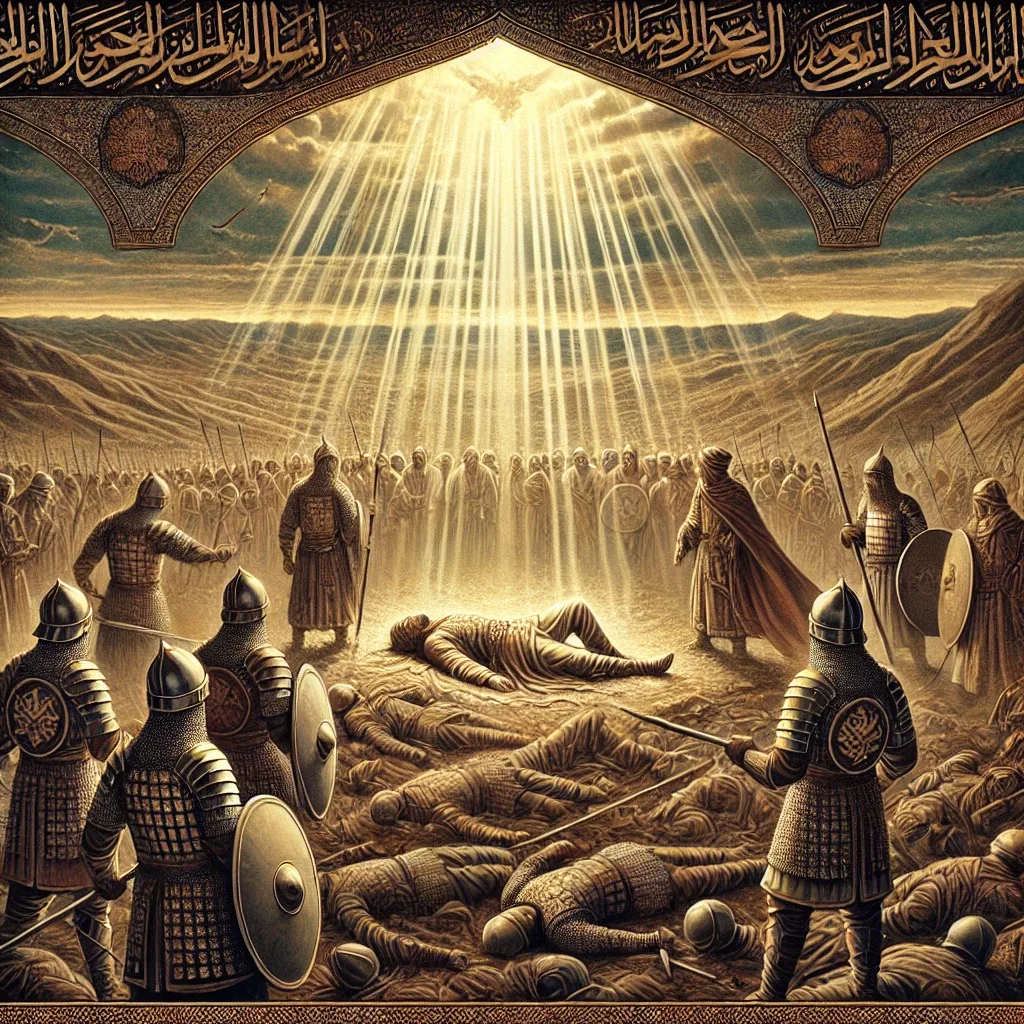
This discovery served as evidence that Ali ibn Abi Talib (may ALLAH be pleased with him) was on the side of truth, not only in this situation, but in all other matters as well.
Seeds of Division: The Prophet’s Warning about the Kharijites
The story begins with Abu Sa’id Al-Khudri (may ALLAH be pleased with him) narrating, saying,
“I was with the Prophet (Peace be upon Him) while he was distributing the spoils of war. A man named Dhul-Khuwaisira from the tribe of Tamim came forward and said, ‘O Muhammad, be just, for you have not been just!’ The Prophet (Peace be upon Him) replied, ‘Woe to you! Who would be just if I am not just? I would be a failure and at loss if I were not just‘Umar then said, ‘O Messenger of ALLAH, permit me to strike his neck’. The Prophet (Peace be upon Him) said, ‘No‘“1
The Prophet (Peace be upon Him) then spoke further about this man, predicting that he would have companions whose acts of worship—such as their prayers, fasting, and recitation of the Quran—would cause the companions to feel their own worship was insignificant in comparison. Despite their outward devotion, their recitation of the Quran would not go beyond their throats, meaning it would not penetrate their hearts. They would leave the religion as an arrow passes through its target.
The Prophet (Peace be upon Him) informed his companions about this group, saying they would emerge during a time of division among the people, meaning there would be some kind of split among the Muslims. During this period, a group resembling Dhul-Khuwaisira would appear.
They would outwardly appear to be deeply religious, highly devoted to reading the Quran and fasting, so much so that even the Companions themselves would regard their own worship as insignificant in comparison. However, this outward display of extreme piety was deceptive, for in reality, their recitation of the Quran would not penetrate their hearts, meaning they would not truly believe in it. Instead, they would deviate from the religion. The Prophet (Peace be upon Him) gave glad tidings about their eventual defeat, saying, “They will be killed by the party closest to the truth“2.
When Ali ibn Abi Talib (may ALLAH be pleased with him) found the corpse of the man described in the Prophet’s (Peace be upon Him) hadith, it became clear evidence that he was on the side of truth in all the disputes that had arisen between him and the other Companions (may ALLAH be pleased with them all), which ultimately led to the Battle of Jamal and the Battle of Siffin. This event helped to confirm that Ali’s position was the most correct.
The Great Fitna: Seeds of Division after Uthman’s Murder
The story of their rebellion brings us to the events of the Fitna (civil strife) that occurred after the assassination of Uthman (may ALLAH be pleased with him). Among those involved in the killing of Uthman were some who supported Ali. It is important to note that some individuals involved in this Fitna were involved in forging letters attributed to various Companions. Just as they forged letters in Uthman’s name, they also forged letters in the names of Aisha (may ALLAH be pleased with Her) and Ali ibn Abi Talib, inciting people to kill Uthman and revolt against his rule.
Both Ali and the Companions denied having written these letters, but in the tense atmosphere of Fitna and the spread of rumors, the truth became obscured. In reality, Ali ibn Abi Talib (may ALLAH be pleased with him) sought to calm the situation, aiming to prevent further bloodshed. However, after the Caliph’s death, the number of rebels and troublemakers grew in Medinah. It would not be accurate to say they controlled the city in the sense of having official authority, but they were indeed numerous. As often happens during times of civil strife, masses gathered and aligned themselves with the discord, further complicating the situation.
The rebels were present in Medinah, and many Bedouins had also come into the city, causing chaos to spread. Ali ibn Abi Talib (may ALLAH be pleased with him) sought to calm the situation, hoping the Fitna would subside and people would return to their homes, tribes, and lands. His goal was to restore order first, and once stability and authority had been re-established under the Muslim Caliph in Medinah, then retribution could be taken against Uthman’s killers.
However, this approach was not agreed upon by all the Companions. Some felt that delaying retribution for Uthman’s killers meant neglecting one of ALLAH’s prescribed punishments—the law of retribution. They believed that it was possible to exact justice for Uthman’s death without waiting for months or even years, as they felt immediate action was necessary.
The Battle Lines Form: Muawiyah’s Stand and the Path to Civil War
This situation led to Muawiyah (may ALLAH be pleased with him) in Syria, who was a blood relative of Uthman (since he was from the same tribe of Umayyah) refusing to pledge allegiance to Ali (may ALLAH be pleased with him) unless retribution was taken for Uthman’s death. Muawiyah, as you know, was the son of Abu Sufyan and the grandson of Harb ibn Umayyah, while Uthman was from the same lineage, being the son of Affan ibn Abi Al-As, also of the Umayyad tribe. Given their shared family background, Muawiyah felt personally compelled to seek justice for Uthman’s death.
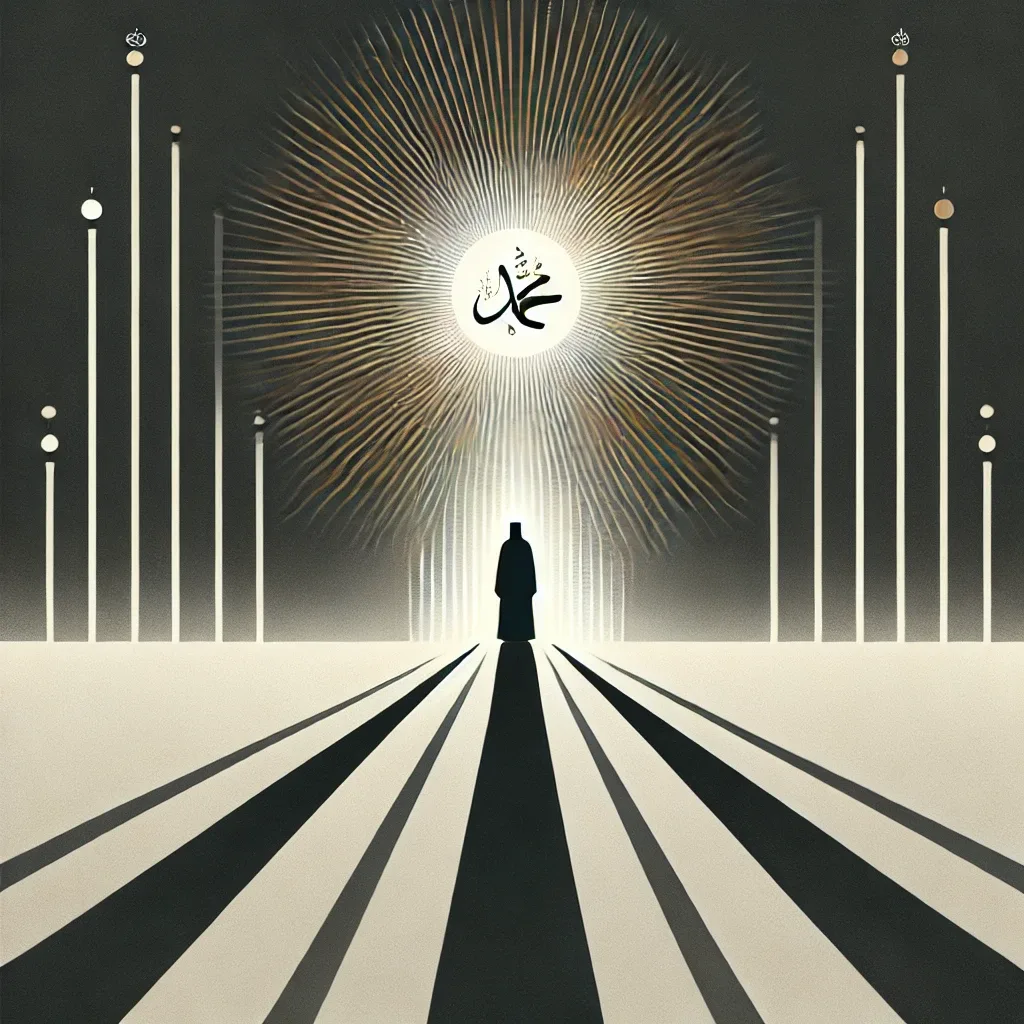
Some Companions, such as Talha, Al-Zubayr, and Aisha (may ALLAH be pleased with them all), believed that if they could rally support and take action against those responsible, it might bring about reconciliation and restore unity among the people. This led to the Battle of Jamal and eventually the Battle of Siffin.
However, when we examine the events of this Fitna in greater detail, we see that the situation was highly confusing. Many of the individuals who had been involved in Uthman’s killing and the rebellion against him were now part of Ali’s army. In the atmosphere of Fitna, it appeared to some as though Ali himself might have been complicit in Uthman’s death or, at the very least, sheltering the rebels. This misunderstanding was a core issue in the Fitna, especially with Ali’s decision to initially try and calm the situation rather than seek immediate retribution for Uthman’s murder.
The details of the Fitna were indeed very perplexing, and even the most insightful minds—those of the Companions, who were the most intelligent, pious, knowledgeable, and God-fearing individuals—differed in their understanding of the situation. Therefore, it is absolutely inappropriate for us today to adopt a simplistic or superficial stance regarding the Fitna.
In any case, Ali’s army and Muawiyah’s army clashed in the Battle of Siffin, which saw intense fighting. This was preceded by the Battle of Jamal, where Ali’s forces faced the armies of Al-Zubayr, Talha, and Aisha.
Both sides believed they were on the side of truth. Muawiyah, in particular, believed that by defending Uthman, he was standing for justice. There were hadiths of the Prophet (Peace be upon Him) that foretold Uthman’s unjust killing and described him as a Caliph who would face persecution. As a result, Muawiyah thought that anyone who followed Uthman’s path or raised the banner of retribution for him was in alignment with the truth described in those hadiths.
The Arbitration Crisis: Birth of the Kharijite Movement
The battle grew more intense, and the casualties began to mount. As the fighting continued, some people began to realize that if the battle persisted, it would lead to the destruction of the Arab heroes who had previously conquered Persia and Rome. Faced with this dire situation, the idea of arbitration emerged as a way to halt the conflict.
In contemporary terms, the concept of arbitration meant entering into negotiations, but with religious authority, meaning that the arbitration would be based on the Quran and the Sunnah. At this critical juncture, both Ali ibn Abi Talib and his army, as well as Muawiyah and his forces, agreed to arbitration, recognizing the need to stop the fighting in order to prevent further devastation of the Arab forces.
Ali sent Abu Musa Al-Ash’ari (may ALLAH be pleased with him) to represent him in the arbitration, and Muawiyah sent Amr ibn Al-As (may ALLAH be pleased with him). However, what concerns us in this context is that at this moment, the Kharijites emerged, accusing Ali of deviating from ALLAH’s Book. They claimed that by allowing men to judge in religious matters, Ali had violated ALLAH’s commands. They proclaimed, “There is no judgment except ALLAH’s”.
The Kharijites developed this concept further until they declared Ali ibn Abi Talib a disbeliever, arguing that by turning to human judgment in the matter of arbitration, he had abandoned ALLAH’s judgment. This rapid progression revealed their narrow mindset and superficial understanding, reflecting a constricted psychology that lacked depth and comprehension.
After parting ways with Ali’s army on their return from Siffin to Kufa, they established themselves in a village called Harura, and thus they came to be known as the Haruriyyah. There, they appointed a leader, AbduLLAH ibn Wahb Al-Rasibi—who joined them at a later stage—and another leader to lead their army, maintaining their stance.
These Kharijites, initially four thousand strong, had separated from an army of fifty thousand. Despite their small numbers, their asceticism, Quranic recitation, and lengthy worship, combined with their zealous arguments rooted in the Book of ALLAH and the Sunnah of HIS Messenger, attracted many to their cause. Their numbers grew to eight thousand, and later to around ten thousand. They became united in their beliefs, openly declaring Ali a disbeliever.
The Great Debate: Ibn Abbas’s Intellectual Victory Over the Kharijites
Ali, on the other hand, tried to engage with the Kharijites and sent some of the Companions to debate with them. The most famous of these debates was the one conducted by our master AbduLLAH ibn Abbas (may ALLAH be pleased with him). In this debate, the stark contrast between superficial thinking and narrow-mindedness on the one hand, and the mentality of a jurist and the spirit of a preacher on the other, became clear.
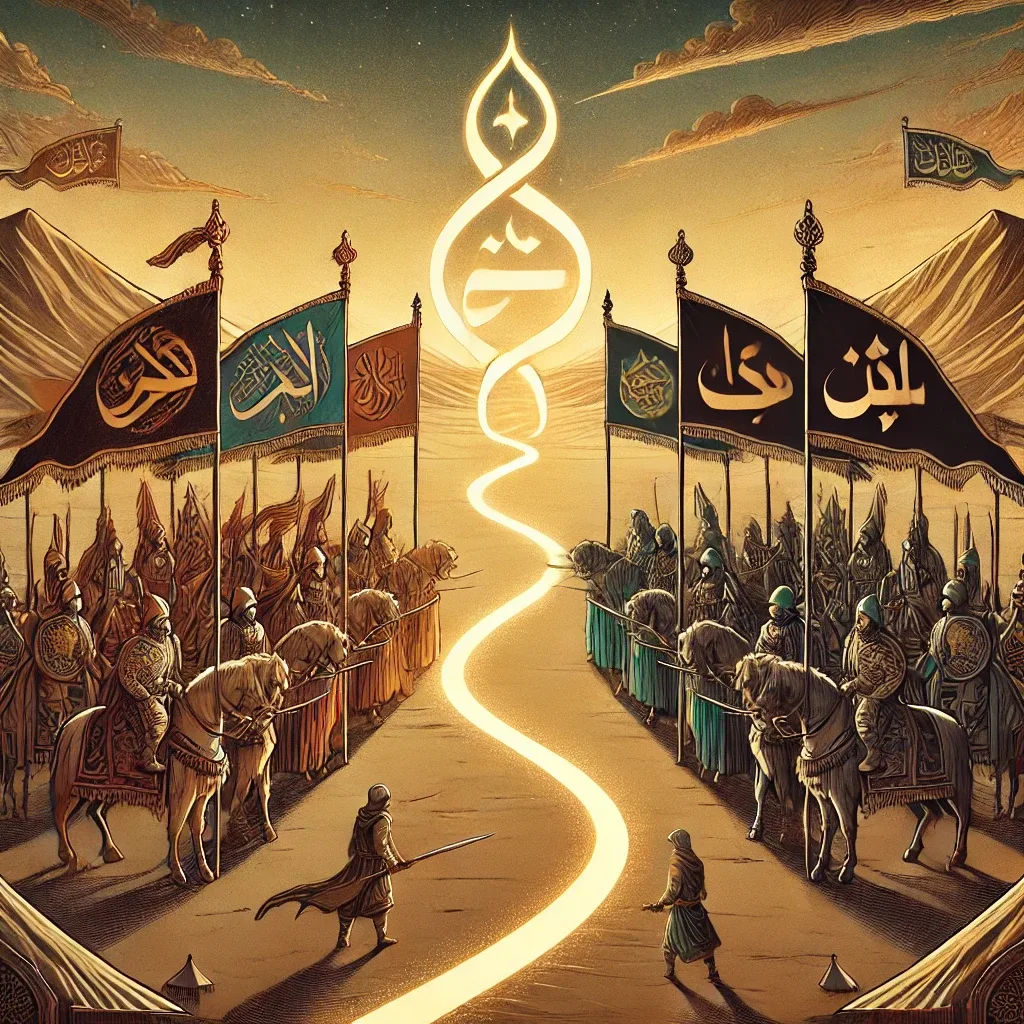
AbduLLAH ibn Abbas dressed in his finest clothes, utilizing all the tools of persuasion a preacher might use to reach their hearts. He approached the Kharijites and began by saying, “I have come to you from the Companions of ALLAH’s Messenger, from the Muhajirun and Ansar, and none of you is from among them“—since, of course, there were no Companions among the Kharijites.
“They are the ones to whom the Quran was revealed, and none of you is more knowledgeable about its interpretation than they are“,
he continued, emphasizing that the Companions were the most knowledgeable people regarding ALLAH’s Book, having witnessed its revelation.
“And I have come to you from the cousin of ALLAH’s Messenger and his son-in-law. What do you hold against Ali?“
They responded with three objections. The first objection was that Ali allowed men to judge in ALLAH’s religion. In contemporary terms, this meant they believed Ali had placed human judgment above the divine judgment, implying that he preferred a man-made decision over what was revealed in ALLAH’s Book.
Ibn Abbas, recognizing their ignorance, responded by offering to debate them using ALLAH’s Book and the Sunnah of His Messenger (Peace be upon Him). They agreed, and Ibn Abbas began, “Indeed, ALLAH the Exalted has allowed men to judge in matters even as small as a quarter dirham“. He then quoted the verse from Surah Al-Ma’idah:
“O you who have believed, do not kill game while you are in the state of iḥrām. And whoever of you kills it intentionally – the penalty is an equivalent from sacrificial animals to what he killed, as judged by two just men among you“3
(Suraat ‘Al-Maa’idah, 5:95)
Ibn Abbas explained that this verse refers to a situation during pilgrimage where hunting is forbidden, and if someone hunts, they must offer compensation equivalent to what they killed. The verse specifies that this compensation is to be determined by “two just men among you”—meaning two Muslim men who are entrusted with making the judgment.
Ibn Abbas continued, pressing his point:
“I ask you by ALLAH, is the judgment of men in reconciling between people and preventing the shedding of Muslim blood more worthy than in the matter of a rabbit?“
They replied, “Rather, in reconciling between people and preventing bloodshed”.
Ibn Abbas then presented another example: “And ALLAH allowed men to judge in the matter of a man and his wife, saying:
“And if you fear dissension between the two, send an arbitrator from his people and an arbitrator from her people. If they both desire reconciliation, ALLAH will cause it between them…”4
(Suraat ‘An-Nissaa’, 4:35)
Did ALLAH allow judgment in the case of a man and his wife but not in the matter of the Muslims as a whole?“
The Kharijites replied, “We accept this”.
Ibn Abbas then asked, “Have you moved past this objection?” They responded, “Yes.”
As for their second objection, they argued, “He fought but did not take captives or spoils. If they were disbelievers, then taking them captive and their spoils would have been lawful, and if they were Muslims, fighting them would not have been lawful, nor would taking them captive or seizing their spoils”.
To this, Ibn Abbas replied, “What about Aisha? Would you have liked to take her captive while she is your Mother? If you say she is your Mother, then how could you make her captivity lawful? And if you say she is not your Mother, then you have disbelieved! For ALLAH the Exalted says: ‘The Prophet is more worthy of the believers than themselves, and his wives are [in the position of] their Mothers’5 (Suraat ‘Al-‘AHzaab, 33:6)“.
This argument caused them to reconsider, and they responded, “We have moved past this objection”.
As for their third point, the Kharijites accused Ali of erasing the title “Ameer al-Mu’mineen” (Leader of the Believers) from his name. They argued that if he was no longer the leader of the believers, then he must be the leader of the disbelievers.
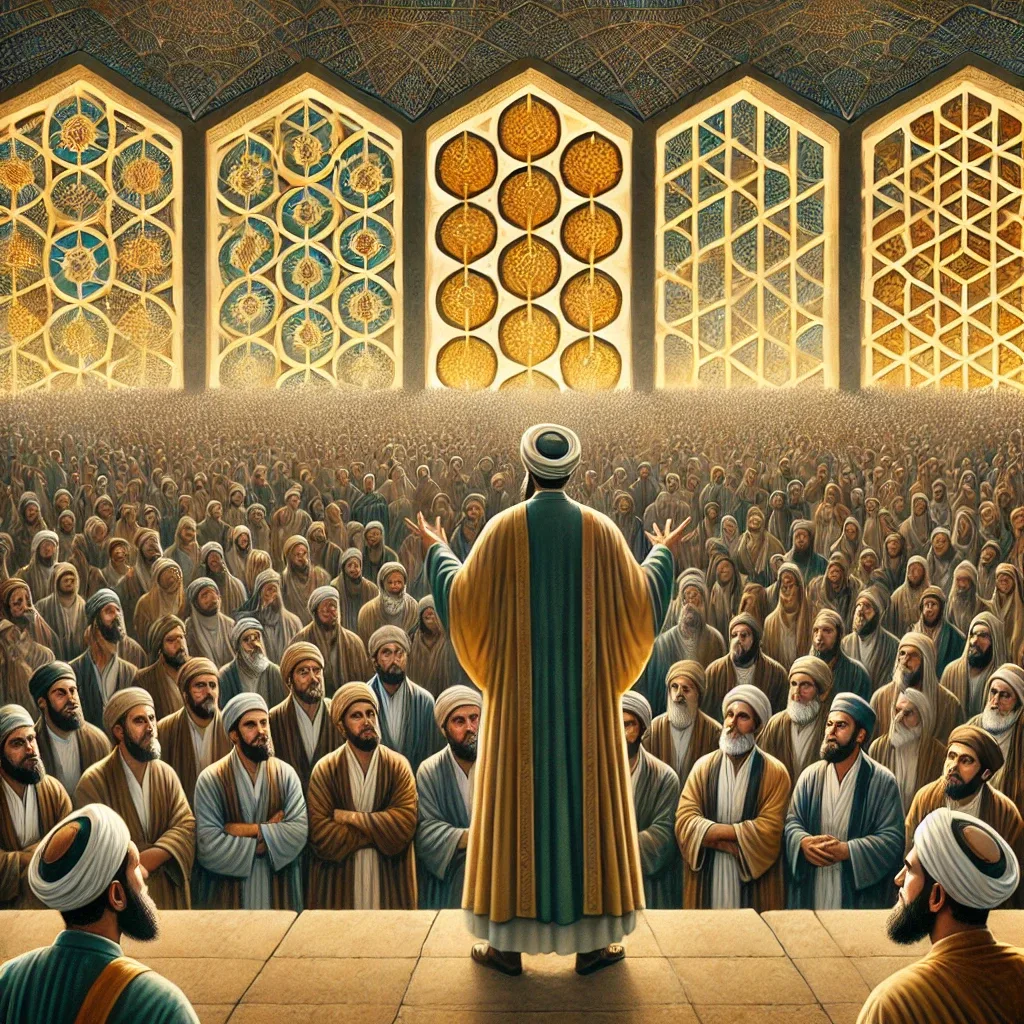
In response, AbduLLAH ibn Abbas (may ALLAH be pleased with him) reminded them of the story of Hudaybiyyah, when the Prophet (Peace be upon Him) negotiated with Suhayl ibn Amr while they were signing the treaty. The Prophet (Peace be upon Him) initially wanted to write “BismiLLAHi RRaHmaani RRaHeem“ (In the name of ALLAH, the Most Gracious, the Most Merciful), but Suhayl ibn Amr objected, saying: “We do not know what RRaHmaani RRaHeem means. Write ‘Bismika LLAHumma’” (In Your name, O ALLAH).
Ali, who was the scribe, was ordered by the Prophet (Peace be upon Him) to erase “‘Ar-RaHmaani RRaHeem“ and write “Bismika LLAHumma, this is what Muhammad, the Messenger of ALLAH, and Suhayl ibn Amr have agreed upon“. Then, Suhayl remarked, “If we had known you were truly the Messenger of ALLAH, we would not have fought you. So write Muhammad ibn AbduLLAH“. The Prophet (Peace be upon Him) replied, “Erase it, O Ali“. Ali responded, “O Messenger of ALLAH, my soul cannot accept this“. The Prophet (Peace be upon Him) then asked, “Where is it?“ Ali pointed to the inscription, and the Prophet (Peace be upon Him) proceeded to erase it himself.
Ibn Abbas reminded the Kharijites of this incident, explaining that even though the Prophet (Peace be upon Him) had erased the title “Messenger of ALLAH“ from his name in this instance, it did not mean that he was renouncing it. This clarification helped dispel their objection, and they were reminded to reconsider their narrow interpretation.
The Aftermath: Ali’s Balanced Response to Extremist Thinking
This debate, along with others that took place between the Kharijites and the Companions, gradually reduced their numbers until they settled at around four thousand, with AbduLLAH ibn Wahb Al-Rasibi as their leader.
The reality becomes clear when we examine their objections to Ali ibn Abi Talib. Their thinking was superficial and narrow-minded. For example, their objection that “he erased his title of Leader of the Believers, so if he’s not Leader of the Believers, he must be Leader of the Disbelievers” is a classic example of non-binding ultimatums. They were essentially forcing Ali to choose between two extreme and flawed options: either he was the Leader of the Believers, or he must be the Leader of the Disbelievers.
Similarly, the Kharijites failed to distinguish between fighting Muslims and fighting non-Muslims. They said, “He fought but didn’t take captives or spoils”, mistakenly applying the rules of fighting disbelievers to conflicts between Muslims. According to their reasoning, either Ali should fight and take captives and spoils, or he shouldn’t fight at all. This line of thinking revealed the narrow-mindedness that characterized the Kharijites, particularly the group of four thousand led by AbduLLAH ibn Wahb Al-Rasibi.
In response, Ali ibn Abi Talib (may ALLAH be pleased with him) clarified their rights, stating,
“You have three rights over us: We will not prevent you from the mosques“—meaning they were free to worship and have access to the mosques, “You will have your share in the war spoils as long as your hands are with ours“—meaning that as long as they fought alongside the Muslims, they were entitled to share in the spoils of war, “and we will not fight you unless you fight us“—which meant that Ali upheld their freedom of thought, even if it led them to declare him a disbeliever, but he drew a firm line when it came to actions that threatened the peace and unity of the Muslim community.
Although the arbitration later failed—meaning the two arbitrators were unable to reach a solution between them—Ali ibn Abi Talib prepared his army once again to confront Muawiyah. However, the Kharijites did not return to Ali’s army. Instead, they remained separate and began testing the beliefs of others, continuing to adopt a radical stance.
From Ideology to Violence: The Point of No Return
Among the first victims of the Kharijites was AbduLLAH ibn Khabbab ibn Al-Aratt (may ALLAH be pleased with him), who was traveling with his pregnant wife. The Kharijites tested him, demanding that he declare Ali a disbeliever. When AbduLLAH and his wife refused to do so, they brutally killed him, his wife, and their unborn child—she was in her ninth month of pregnancy. This act marked the beginning of the Kharijites’ disturbing practice of declaring people disbelievers and justifying their killing by declaring their blood lawful.
At this point, it became clear that the Kharijites posed a greater threat than initially thought. It was impossible for Ali to send an army from Iraq to fight Muawiyah in Syria while these Kharijites remained in Iraq, spreading corruption, testing people’s beliefs, and committing acts of murder.
In response, Ali sent a message demanding that they hand over those responsible for the killing of AbduLLAH ibn Khabbab. They replied, “We all killed him”. Faced with this, Ali’s army changed direction. Instead of continuing toward Syria to confront Muawiyah, they turned their attention to dealing with the Kharijites in Iraq. Ali knew that they could not be allowed to remain in such a state, especially since they were spreading chaos and violence among the Muslim community.
Thus, Ali ibn Abi Talib (may ALLAH be pleased with him) fought the Battle of Nahrawan against the Kharijites, defeating them and scattering their forces. The Kharijite ideology was effectively destroyed at that time, though remnants of it would later reemerge and spread. The Battle of Nahrawan became a defining moment, not only in terms of military victory but also as a clear sign that Ali and those with him were on the side of truth.
One of the most compelling pieces of evidence of this truth came with the discovery of the deformed man among the corpses, as described in the Prophet’s (Peace be upon Him) hadith. The Prophet (Peace be upon Him) had foretold that this group would appear during a time of division among Muslims, and that those who fought against them would be the party closest to the truth.
Ali’s Legacy: A Blueprint for Dealing with Religious Discord
The central point of all this is that Ali ibn Abi Talib (may ALLAH be pleased with him), despite the grave challenges, remained the most just in his dealings with the Kharijites. When asked whether they were disbelievers, Ali replied, “They fled from disbelief“. When asked if they were hypocrites, he responded, “Hypocrites remember ALLAH but little, while these people remember ALLAH much“. When they inquired further, “Then what are they?” he said, “They are people who rebelled against us, so we fought them“.
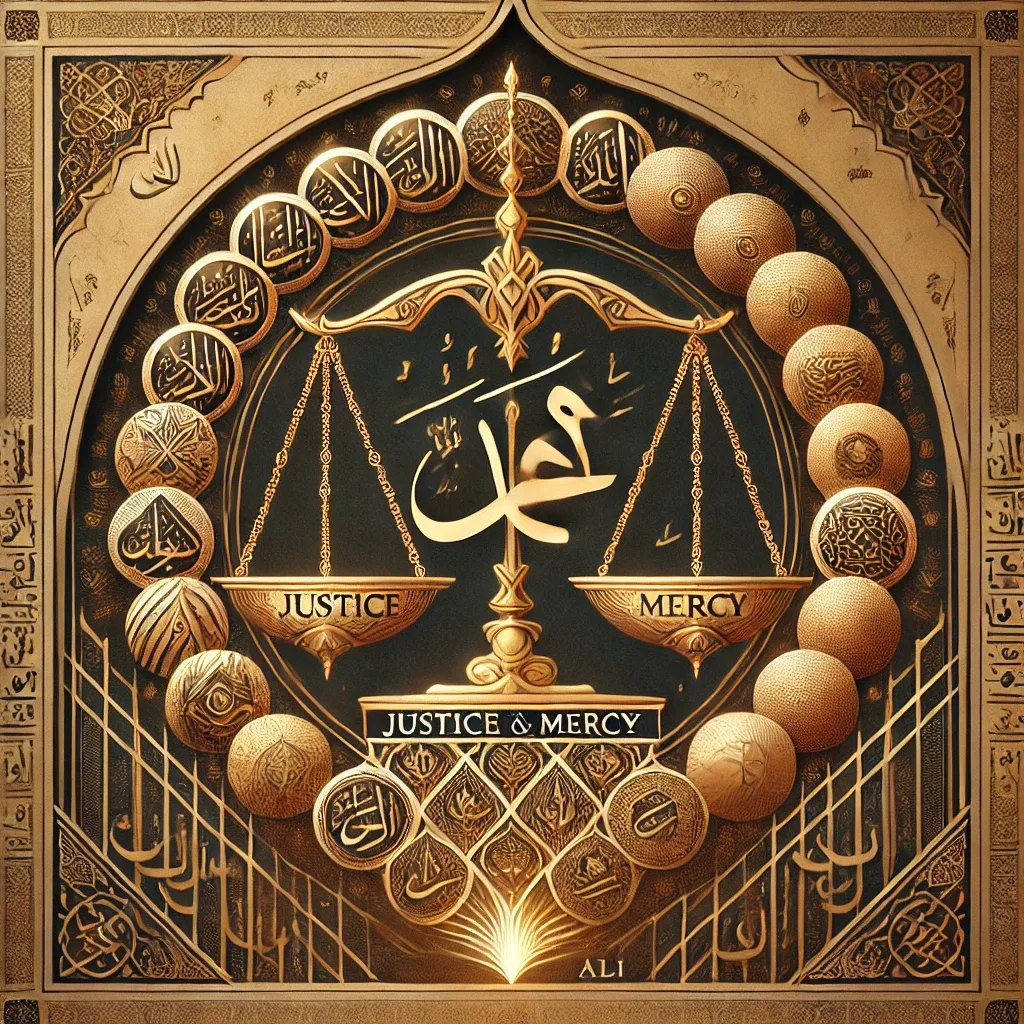
Afterward, Ali offered advice regarding how to handle such groups, stating, “If they rebel against a just ruler, fight them, but if they rebel against an unjust ruler, do not fight them, for they have a valid argument“. Ali’s conduct in dealing with the Kharijites became a foundation for Islamic jurisprudence in addressing groups with narrow-minded, superficial ideologies, which, by their very nature, are divisive and disruptive to the unity of the Muslim community.
The Lasting Danger: When Purity Becomes a Path to Division
The concept of ideological purity, by its very nature, tends to create division. It does not allow for the differences in secondary matters that ALLAH the Exalted and HIS Prophet (Peace be upon Him) permitted within the Muslim community. The Kharijites, in particular, focused more on opposing fellow Muslims than on confronting polytheists or the enemies of Islam. For this reason, the Prophet (Peace be upon Him) described them by saying,
“They kill the people of faith and leave the people of idols“
This mindset became one of the factors that contributed to tension and conflict throughout the history of the Muslim community.
Through this, we see how Ali ibn Abi Talib (may ALLAH be pleased with him) dealt with those who declared him a disbeliever, how he maintained justice by giving them their rights, and how he provided guidance on how to deal with such groups in a fair and balanced manner.
I ask ALLAH the Exalted to teach us what benefits us, to benefit us through what HE has taught us, and to increase us in knowledge.
Sources:
- Mohamed Elhamy. محمد إلهامي | عصر الخلافة الراشدة | 14. فتنة الغلو: الخوارج. YouTube Video.

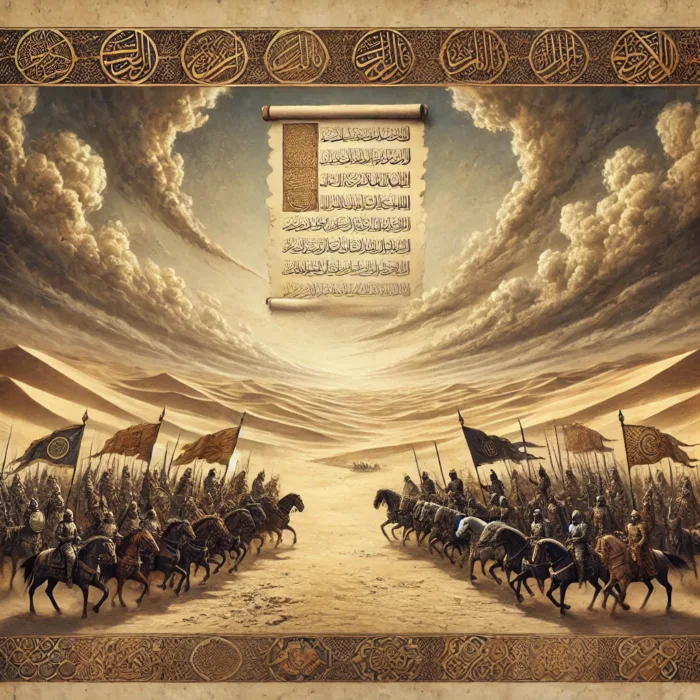
1 thought on “The Battle of Nahrawan: How Ali ibn Abi Talib Confronted the First Islamic Extremist Movement (Kharijites)”